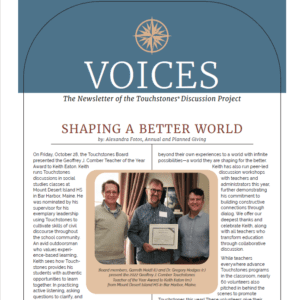By Abraham Zhao
The staff at Touchstones is hard at work making necessary transitions in this new educational environment online. Some teachers we have talked with believe the shape and nature of education has permanently changed due to the pandemic. I am inclined to agree. The coronavirus crisis has demanded adaptability from all walks of life and it seems the adaptations our education systems have made so far will remain as features of teaching even as things (hopefully) return to normal. While Touchstones is still fundamentally based on the in-person discussion experience, we have been exploring various ways to bring our tried and tested developmental programs successfully into the new, remote-access world.
Already this spring, we began converting our discussion curricula into digitally accessible formats. Schools from Canada, New Jersey, and Pennsylvania, have already used those materials in different online environments. Sometimes the Touchstones classes are run in real-time with students connecting by video and other times students are conducting their discussion using written comments over several days.
For the foreseeable future, our workshops will be delivered online. Our staff has conducted a number of training and coaching sessions using Zoom and has run Teacher Meetups and Community Discussion programs twice monthly since March. To help set the stage for constructive and inclusive discussions, we developed guidelines that encourage collaboration as much as possible.
And the best news is that we have seen great results. Just recently, Touchstones ran a two-day workshop for the Mount Desert Island Regional School System in Maine. The school district has chosen Touchstones curricula as a complement to the work they are already doing to foster students’ critical thinking but also to achieve new standards in civil discourse. My role was primarily to support the workshop’s technological requirements and the group in action but also to engage directly with teachers for certain activities, including small group work. We were all relieved that there were almost no technical issues during the workshop (aside from two times when connectivity was briefly interrupted). And the participants helpfully followed our guidelines.
Using many of the tools provided in Zoom for breakout rooms and polling, we’re able to translate the small group work and evaluation that is central in the Touchstones method. The fluidity in the online delivery supported the same engagement, reflection, and authentic connections and bonds among participants that form during in-person workshops.
Over the two days, the group grew noticeably in their discussion skills and collaboration. Their evaluations revealed new insights and understanding. Most importantly, we heard them express how the workshop helped them identify better with their students as learners in this environment— to more fully anticipate what types of support their students will need as they get started with Touchstones this fall.
Shelagh McLoughlin, a high school social studies teacher, wrote of her experience afterward, “You provided such guidance with a steady hand, not shaming but asking us all to reflect and think critically. I feel so connected to our group, it feels strange not to be meeting again tomorrow… . Everything is just so intentional I love every aspect of this and really think it will help all of us not just in our classrooms but with our professional relationships as well. Thank you for doing this work with us and so many groups around the world. The world certainly needs to talk to each other.”



 Join the
Join the